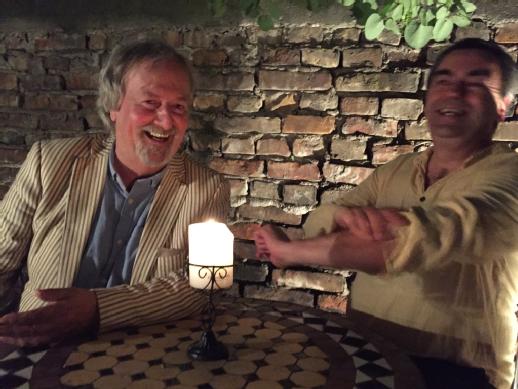Theatre & Performance Studies News
In Memoriam - Professor Jim Davis
 It is with a very heavy heart that we write to let you know that Professor Jim Davis passed away on Saturday 4th November following a stroke. Everyone who had the pleasure of encountering Jim will appreciate that this is a huge loss for his family, friends, colleagues, collaborators and the wider research community. He was a fantastic scholar and unwavering champion for the discipline and theatre historiography. He was such an important part of the Theatre and Performance family at the University of Warwick and will be missed for his leadership, mentorship, friendship and unfailing sense of fun and mischief.
It is with a very heavy heart that we write to let you know that Professor Jim Davis passed away on Saturday 4th November following a stroke. Everyone who had the pleasure of encountering Jim will appreciate that this is a huge loss for his family, friends, colleagues, collaborators and the wider research community. He was a fantastic scholar and unwavering champion for the discipline and theatre historiography. He was such an important part of the Theatre and Performance family at the University of Warwick and will be missed for his leadership, mentorship, friendship and unfailing sense of fun and mischief.
Jim Davis joined Warwick in 2004 as Head of Department (2004-2009) after eighteen years teaching Theatre Studies at the University of New South Wales in Sydney, where he was latterly Head of the School of Theatre, Film and Dance. In Australia he was also President of the Australasian Drama Studies Association and member of the Board of Studies of the National Institute of Dramatic Art. Prior to leaving for Australia he spent ten years teaching in London at what is now Roehampton University. He co-organised many conferences including for the International Federation of Theatre Research (IFTR) in New South Wales and at Warwick. He convened Historiography Working Groups for both IFTR and for TaPRA. He served as an editor for the journal Nineteenth Century Theatre and Film.
He published widely and with considerable critical acclaim in the area of nineteenth-century British theatre. His most recent bookComic Acting and Portraiture in Late-Georgian and Regency England (2015) won the TaPRA David Bradby Prize for Research in International Theatre and Performance in 2017 and was shortlisted for the 2015 TLA George Freedley Memorial Award. His other publications include Theatre & Entertainment (2016), Dickensian Dramas: Plays from Charles Dickens Volume II (2017) and European Theatre Performance Practice Vol 3 1750-1900 (editor, 2014). He was also joint author of a study of London theatre audiences in the nineteenth century Reflecting the Audience: London 1840-1880 (2001), which was awarded the 2001 Theatre Book Prize. He contributed numerous chapters including essays on nineteenth-century acting to the Cambridge History of British Theatre and on audiences to the Cambridge Companion to Victorian and Edwardian Theatre. He also published many articles in Theatre Journal, Theatre Survey, Theatre Notebook, Essays in Theatre, Themes in Drama, New Theatre Quarterly, Nineteenth Century Theatre, Theatre Research International and The Dickensian. He was also responsible for many of the theatrical entries in The Oxford Readers' Companion to Dickens and contributed to the Oxford Encyclopaedia of Theatre and Performance, The Cambridge Encyclopaedia of Stage Actors and Acting and the New Dictionary of National Biography. For several years he wrote an annual review of publications on nineteenth-century English Drama and Theatre for The Year's Work in English Studies.
An event to celebrate Jim’s life and work was held on 6 January 2024 12pm-4pm in the Studios in the Faculty of Arts Building on the University of Warwick's campus.
Congratulations to Alice Golisano who has been awarded the Warwick-Paris Seine co-tutelle EUTOPIA scholarship
Congratulations to Alice Golisano who has been awarded the Warwick-Paris Seine co-tutelle EUTOPIA scholarship. Alice will be joining us in September 2019.
Bio
Alice has a BA in Translation Studies from the University of Genova, Italy and graduated in January 2018 with her MA in the arew nad Perfomrance Research at the University of Warwick/
About the PhD project:
The working title of the PhD is 'International theatre festivals as means of building European cohesion and a form of resistance against the populist drift', and it wants to explore the political and ‘diplomatic’ role of European Theatre Festivals, taking the Festival d’Avignon, the SibFest, the Bitef, and the RomaEuropa Festival as case studies. My claim is that European International Theatre Festivals are examples of those third spaces that Foucault labels as ‘heterotopia’, hybrid spaces that act as ‘worksites for democracy’, places of symbolic and physical contact between cultures, where a process of cohesion and (re)building can commence. I will question if international theatre festivals can be regarded as worksites for democracy, when much of its values are being lost in the recent rise of populism. If they can take up an active role as cultural mediators and promote a feeling of Europeanness outside the EU geopolitical borders. And whether the technocratic EU could rely more on such international events to promote cohesion during times of membership negotiations and disagreements regarding the different migration policies. By putting in dialogue the analysis of performances and curatorial choices of different European Theatre Festivals with current political theories on nationality, European identity and belonging, this project aims to contribute to the field of cultural diplomacy and help generating new ways of thinking about the approach to matters of international interest not solely in a strictly political way.
